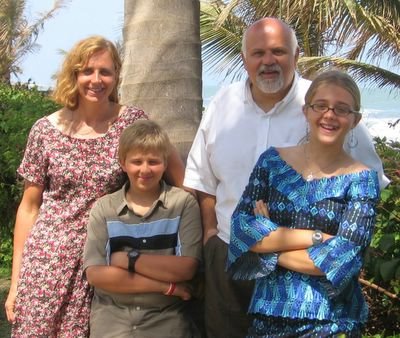Weather: After seeing over ten inches of rain Tuesday the 31st, Wednesday and Thursday are dry. Thursday is mostly sunny with high clouds and a light westerly breeze. Temps in the 80's.
One of the most obvious differences between African culture and North American culture is in the way people relate, how they view each other. Americans act from a more individualist perspective, Africans from a collective or group perspective. Typically, when Americans speak of family, they mean what sociologists call the “nuclear” family— comprising parents and children. In Africa, “Family” includes the “extended” members—grandparents, aunts, uncles, cousins—but also close friends or even long-time acquaintances. Also, the concept of “ownership” is more fluid, and likely less clear-cut to an American eye. In America, what’s mine is mine and what’s yours is yours. Don’t ask me for what’s mine and I won’t ask you for what’s yours. In Africa, what may begin as yours may be requested by me if I have a more compelling need. In the LEAD business classes, we see these cultural norms in constant conflict as LEAD participants try to make their businesses work while a steady stream of “family” members lay competing claims to business profits. One of the principles Renita has tried to hammer home to her LEAD business people is: “If you give away your profits for “family” requests—your business will be affected accordingly. Actually, the money is not really yours to give—it is the business’s money.”
Easier said than done, and sometimes our business people become poignantly creative to trying to be good business people and good friends.
Take Percy for instance.
Percy is a tailor. Like thousands of others, he toils long hours making clothes for little profit. Like thousands of others, he fends off daily requests from “family” to assist will real needs. Up until now, he gave in and the business took the hit. The other day, he shared in class that he was happy to have a recent accounts receivable of $150 US paid back to the business. He would not “eat” the money, but reinvest it—perhaps in material or even a second machine. However, that evening a friend of his came to tell him that the friend’s son was in the hospital, and that he needed money to pay for his son’s treatment. “Please,” said the friend, “I beg you. I will pay you back.” Percy faced a very familiar and difficult decision. The reasons to loan the money was, as always, a good one. Would he help another friend or protect his business? Percy looked at the money in his hand, looked at his friend, and thought about the class. If he did not begin setting limits, his business could never become profitable. He decided. “No, I cannot use the money from the business to help your son.” After pleading and cajoling for a while, the friend became sad and even insulted. “How can you do this,” he asked, and left empty handed. Percy felt the guilt most people feel when they try to establish good boundaries. He did not sleep well that night. He knew he was doing the right thing by not giving away the business’s money, but he cared about his friend’s son. The next day, he found his solution. He had a small television that might be worth something. He took the TV into town, sold it, and brought the money to the friend at the hospital. He honored his business, he honored his friendship, but the juggling act cost him a TV.
Renita says, “I find Percy’s solution moving. It makes it real that people in Liberia face difficult choices every day: to say no to your friends and relatives can risk their health and very wellbeing, not mention brands you as “uncaring” or “selfish.” However, to give money each time you are asked risks your livelihood and causes the eventual dependence on someone else to help you. There is a social and relational cost to moving out of poverty, and not everybody is willing to pay the emotional price attached. A frequent theme we hear at the graduation from LEAD's classes is that ‘LEAD made me to be mean.’ They say this with a smile on their face and in a positive way, but we understand the truth behind it.”
To make healthy decisions here sometimes requires the Wisdom of Solomon as Liberians weigh important new values with time honored traditions. Percy’s solution suggests that for Liberia to grow, new, creative ways will need to be found provide balance to competing values. But Percy’s solution also suggests that no matter the solution, it will come with a cost.
Subscribe to:
Post Comments (Atom)


2 comments:
Hi Bob and Renita, Hannah and Noah!
Thinking of you today. We really enjoyed getting to know you a little when we visited with Lifewater.
Emmanuel and Fatu Bimba just emailed and they are thinking about starting a brick and cement business on the property of their orphanage. I recommended that he get in touch with Renita at LEAD, but I'm not sure how. Could you forward me your contact info again?
Peter Brown
www.humanwave.com
What a moving and enlightening story. Thanks for sharing your experiences!
Sharon
Post a Comment